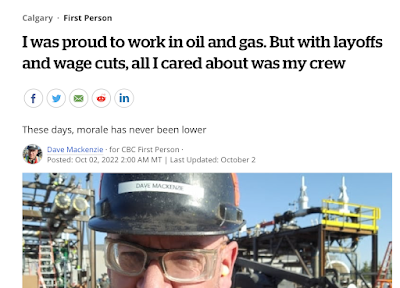I flag it for a couple of reasons. One of the more tedious talking points of the Kenney government is that there is some kind of esteem gap between white-collar and blue-collar occupations. The gist of the narrative is that people (e.g., students, parents, teachers, and workers) think they are too good to do a blue-collar job (so basically it is a worker-blaming narrative, not all that different than equally ridiculous assertion that people no longer want to work).
Like most things Jason Kenney said as premier, there isn’t really any evidence that this esteem gap exists. (The two people I have been happiest to see in my life are an ER doc and a plumber, and not necessarily in that order.) Rather, this putative esteem-gap is just a dog-whistle pretext designed to justify increasing investment in skilled trades training and reduced investment in university education. Why would Kenney do that?
Well, Kenney’s actions as a federal minister suggest he often assists employers to minimize labour costs buy flooding the labour market with workers (think back to the temporary foreign worker deluge of 2008-12). Increasing the number of skilled trades people allows employers to suppress demands for better wages and working conditions because there is always a surplus of workers.
The first-person account of working in a welding shop in the oil-and-gas industry unintentionally highlights a number of structural reasons that workers may be reluctant to engage in blue-collar work (that have nothing to do with people thinking they are too good for that work):
- Job demands: The author flags that the work is difficult, dangerous, and often entails working in unpleasant conditions at odd times. Workers are often unwilling or unable to work in these conditions. This has historically constrained the labour force and driven up wages. Corporations have responded in many ways to reduce labour costs, such as automation, off-shoring, and subcontracting work.
- Insecurity: The oil-and-gas sector has organized work in ways that externalizes risk onto workers (in the form of layoffs and wage cuts) to maximize corporate profitability. The author notes that one new and very skilled worker had soured on the industry after three layoffs in five years. (This insecurity also a key barrier to apprentices completing their training, but note that Kenney’s training announcements never engage with this issue.)
- Restructuring: The author notes that austerity, tax cuts, and rising energy prices had made him hopeful that his job would have more security. This didn’t happen because trickle-down economics (which is what he’s talking about) doesn’t work. Very crudely speaking, if you give wealthy individuals and corporations additional income (through tax cuts), they don’t create jobs with it: they just horde it. By contrast, policies that raise wages for low-income workers do create new jobs because low-income workers spend the money and that creates demand (and new jobs).
So, what can we learn from this:
- Employers care about profit and treat workers instrumentally. If there is a way to increase profit and the effect is to make workers’ lives worse, employers will do so. This is particularly the case when there is a surplus of workers so the workers have little labour market power to exert.
- Governments, especially conservatives ones, are typically happy to help employers create a loose labour market that worsens wages and working conditions. To stifle dissent about policies that are actually screwing the workers who comprise the bulk of the electorate, governments will happily invent or manipulate facts. No one wants to work. People think they are too good for blue-collar work. And so forth.
- Workers are often unable or unwilling to incorporate this dynamics into their analysis of how the world works. Instead, they will cheer-lead policies that harm their interests (e.g., tax cuts and austerity that destroy the public services they depend upon) in the hope they will see greater stability or a modest wage increase. They will also adopt explanatory narratives that blame workers (people look down in the trades) while ignoring that workers may well be making rational and well-informed choices about what job options are best for them.
This kind of questioning is typically taught in the liberal arts, which is the exact kind of education that the Kenney government has aggressively defunded. That is probably not a coincidence.
-- Bob Barnetson

No comments:
Post a Comment